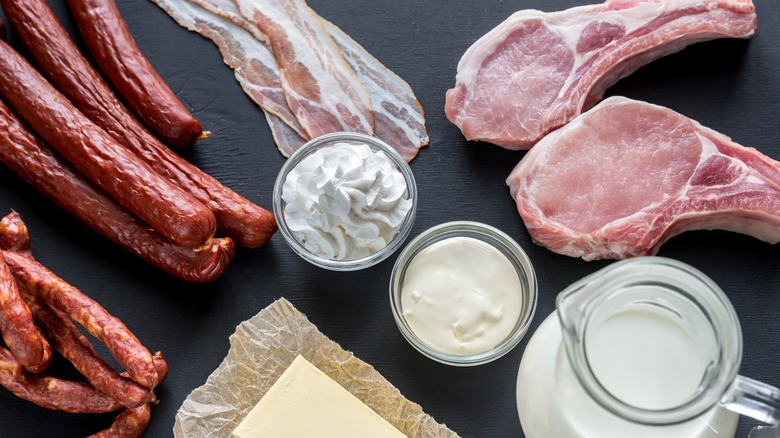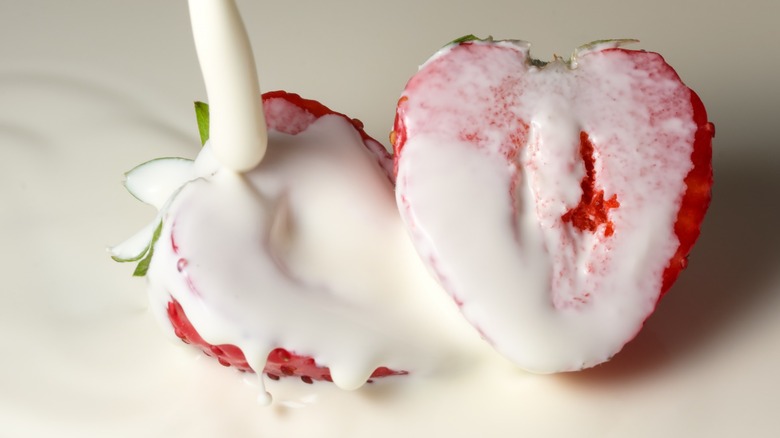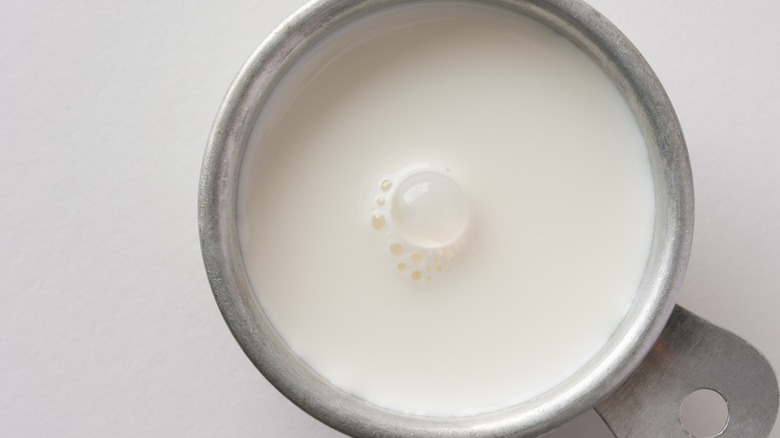You Actually Can Freeze Heavy Cream. Here's How To Do It Properly
Being able to freeze ingredients is necessary to prevent spoilage, especially when you're on a busy schedule and can't afford to keep essential components, like meats and vegetables, consistently at the ready. However, because of the need, there's been a long debate over foods that should never be frozen and vice versa. And dairy products, especially cream, have typically been documented as one item that can't be put in a freezer. Yet that's not strictly true: Heavy cream can be frozen and used at a later date.
Still, some details need to be shared before sticking a carton of cream in the nearest ice box. The most significant issues that must be addressed are the item's fat content and final use. Moreover, not everyone agrees on the specifics, which makes the discussion a bit murky in terms of a definitive answer. Either way, it can be done, and with the proper know-how, you should be able to freeze cream correctly, making the possibility of never having to throw out an expired container all the more exciting.
The type of cream being frozen matters
Most would think that cream is ... cream. Yet there are several styles. What mainly differentiates them is the amount of fat. Clotted cream is known to have the most, with a minimum of 55%. Regardless, most people will deal with heavy, whipping, or light cream, commonly found items within a dairy section.
Knowing a cream's fat percentage is crucial since only one, with 40% milkfat or more, is acceptable for freezing, according to a report by the University of Georgia. Light cream only contains between 18% and 30%, while whipping cream ranges between 30% and 36%, so as a result, heavy cream is the only viable option. But it should be noted that even heavy cream can possess fat at a rate of 36% or above, so read the labels carefully.
Nevertheless, the right fat level helps prevent the ingredient from splitting during freezing. So one of the many substitutes for heavy cream won't be helpful here. While a higher fat ratio is essential, it's a double-edged sword. Fat and pasteurization maintain the cream's integrity, but if it isn't frozen quickly enough, the fat is liable to split once you're ready to use it again. This is because dairy products are organically occurring emulsions due to the fat being mixed in with water, so it makes sense that it will break. Still, because of this, the water in the cream could potentially crystallize into more significant pieces if frozen improperly, impacting the consistency.
Things to consider when freezing heavy cream
Once thawed, agitating cream will reincorporate it, making it useful in some applications. But some argue that it won't whip correctly because of the separation. However, not everyone agrees, with others saying that the component should make a decent whipped cream despite the freezing process. As Chef David Lebovitz wrote on his blog, "Yes, you can freeze cream just fine. Many bakers will sometimes find themselves with an extra cup or so ... So, you can freeze it just by sticking the carton right in the freezer. The liquid inside may expand a bit, so if the containers are absolutely full, you may want to pour a little out first."
Despite Lebovitz's suggestion to leave a little cream behind, he does remark that many packages have extra space, so it may not be necessary. Nevertheless, there's another way to freeze and store smaller amounts. Some advise using an ice cube tray, which is an excellent idea. This solves the issue of larger crystals forming since a minuscule amount of food will freeze faster, but it'll also create more practical portion sizes that can be kept in storage bags for beverages, sauces, or soups.
Either way, the process will let heavy cream be stored in a freezer for at least two months. Depending on who you ask, it may be longer, so check for spoilage before using.


